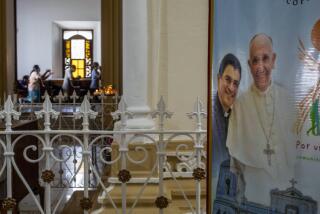Papal Officials Painted Dismal Fate for Noriega
- Share via
PANAMA CITY — The surrender of Manuel A. Noriega was accomplished by extreme diplomatic pressures from Vatican representatives, who even told Noriega they might move their embassy and leave him alone in the compound surrounded by U.S. soldiers and an angry populace, according to sources in Panama and Washington.
Papal Nuncio Jose Sebastian Laboa “painted a very dismal picture” for Noriega, a Western European diplomat said shortly after Noriega’s surrender was announced Wednesday night. “They would have moved the embassy, pulled down the flag and left him there” to face his fate alone, the diplomat said.
Noriega’s diplomatic immunity would have ended if the nunciature were declared to be relocated.
A senior State Department official echoed that version of events, although he said the relocation of the embassy was presented to Noriega as only one option being considered by the Vatican to end the standoff.
The State Department official said he would not characterize the message to Noriega as a threat but as a clear indication of the Vatican’s determination to force him out of the embassy. “The whole purpose was to make him realize that he was isolated,” the official said. “Everyone had to convince him that his only option was to surrender, that it was over.”
He described the negotiations as a “process of elimination” of Noriega’s options, with the clear message being that “everyone wanted him to get out.”
The diplomat said he spoke directly with Laboa after the papal ambassador accompanied Noriega to the gates of the nunciature, as the Vatican compound is known.
“The nuncio explained to Noriega that he had no other choice,” the diplomat said. “If he had stayed in Panama (for trial), he would have been lynched by a mob. If he had been allowed to go to a third country, he would have faced Somoza’s future.” He referred to former Nicaraguan dictator Anastasio Somoza, who was assassinated in exile in Paraguay in 1980, the year after he was overthrown.
“Laboa is a very convincing person,” the diplomat said, adding, “The only place that could guarantee Noriega’s safety was the United States. He can always hope for a mistrial.”
Panamanian Archbishop Marcos McGrath said the turning point came when the nuncio made it “quite clear” to Noriega that he was not welcome in the Vatican embassy indefinitely, and that because he was not going to be considered a political refugee, the Vatican would not help him seek sanctuary in a third country.
Panamanian Vice President Guillermo (Billy) Ford said the nuncio “was able to convince Noriega to leave the nunciature and face justice, and he decided to face U.S. justice.” Ford suggested that the Panama government would try to prosecute Noriega once U.S. courts are through with him--a process that could take years.
“We’ll seek him later,” Ford declared Wednesday night.
Other Administration officials said the U.S. agreed on several terms of surrender for Noriega: that he be able to make a few phone calls and be permitted to wear his uniform, and that his surrender be kept secret until the moment he walked out of the nunciature.
Earlier the Administration promised Noriega he would not be tried on a federal drug-kingpin statute that carries the death penalty, the sources said.
Boudreaux reported from Panama City and Wright from Washington.
More to Read
Sign up for Essential California
The most important California stories and recommendations in your inbox every morning.
You may occasionally receive promotional content from the Los Angeles Times.













